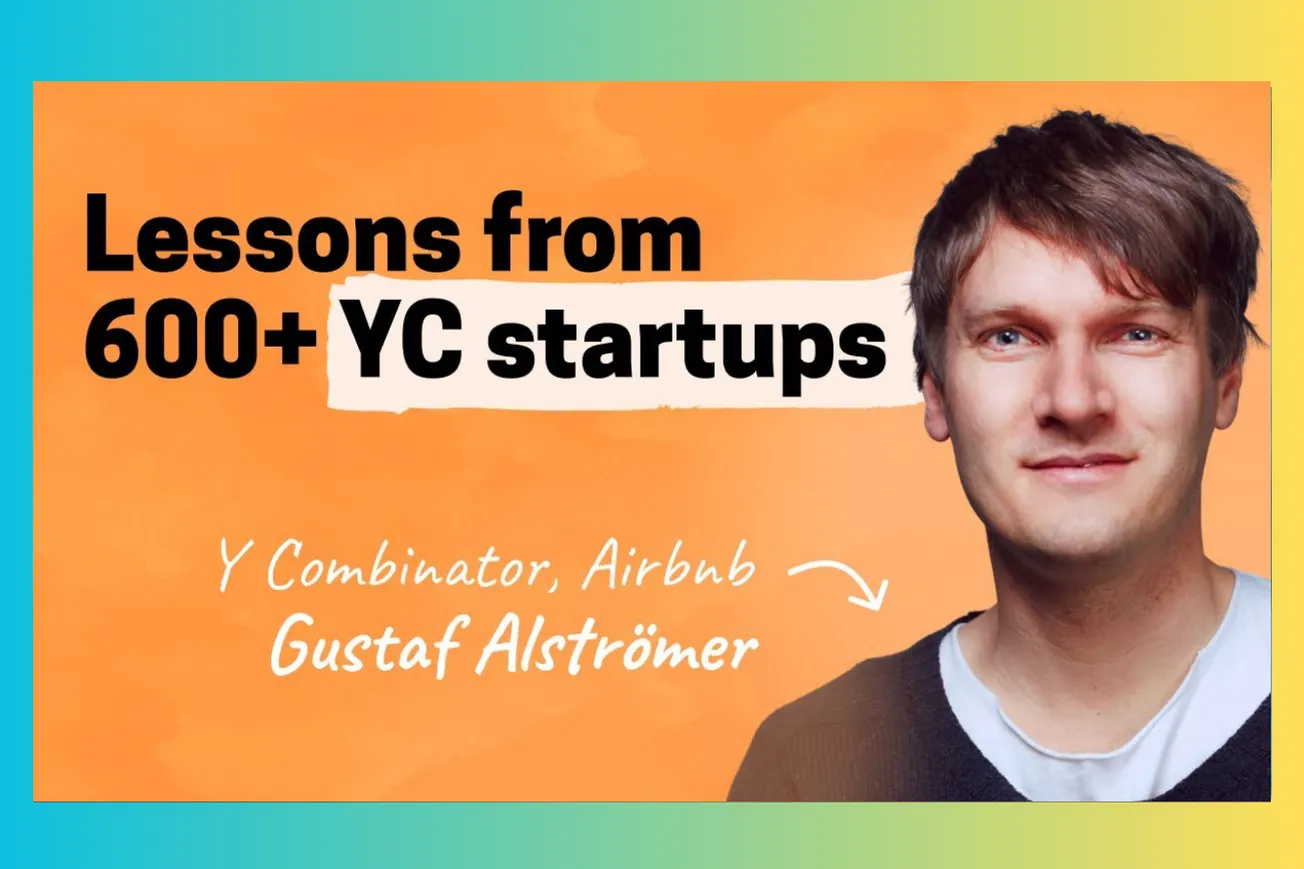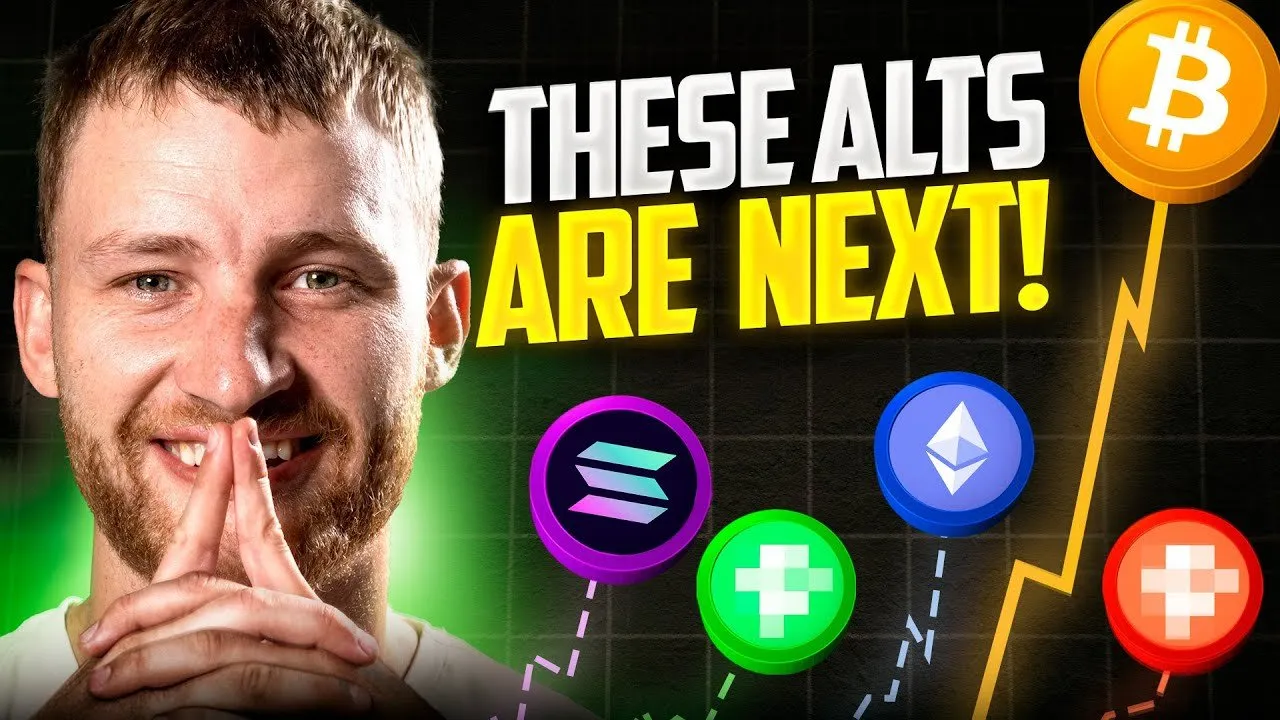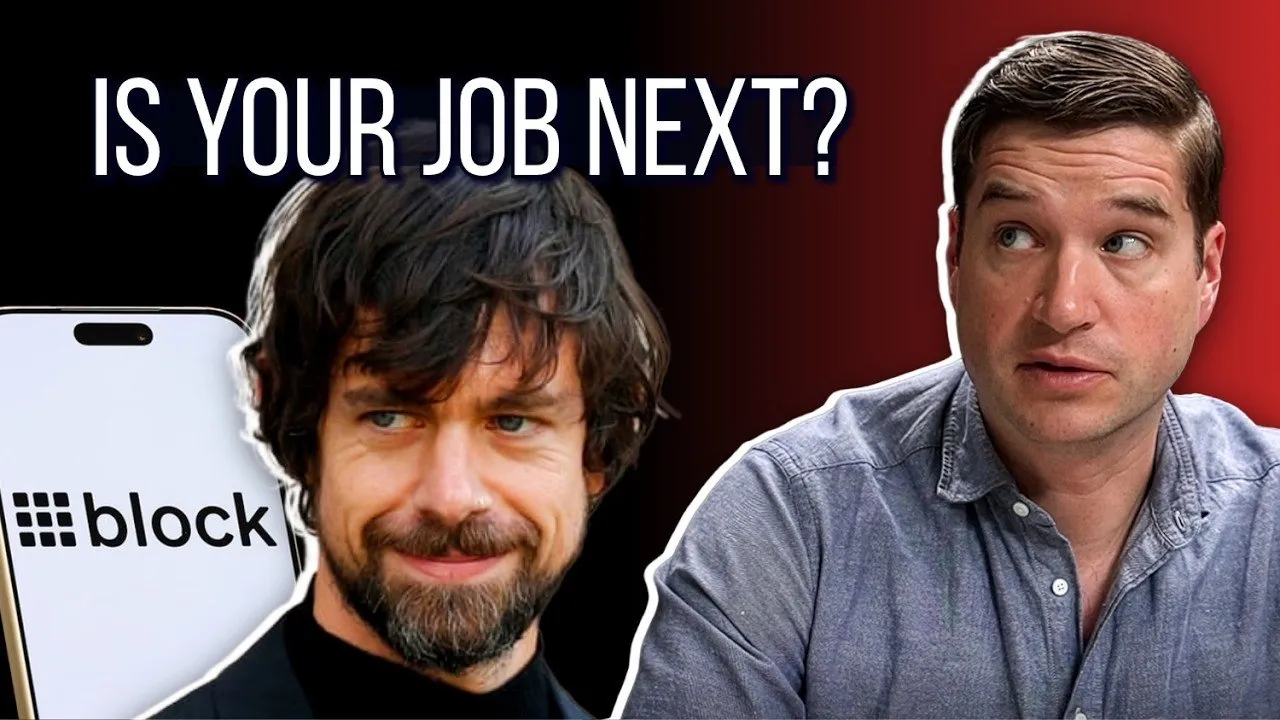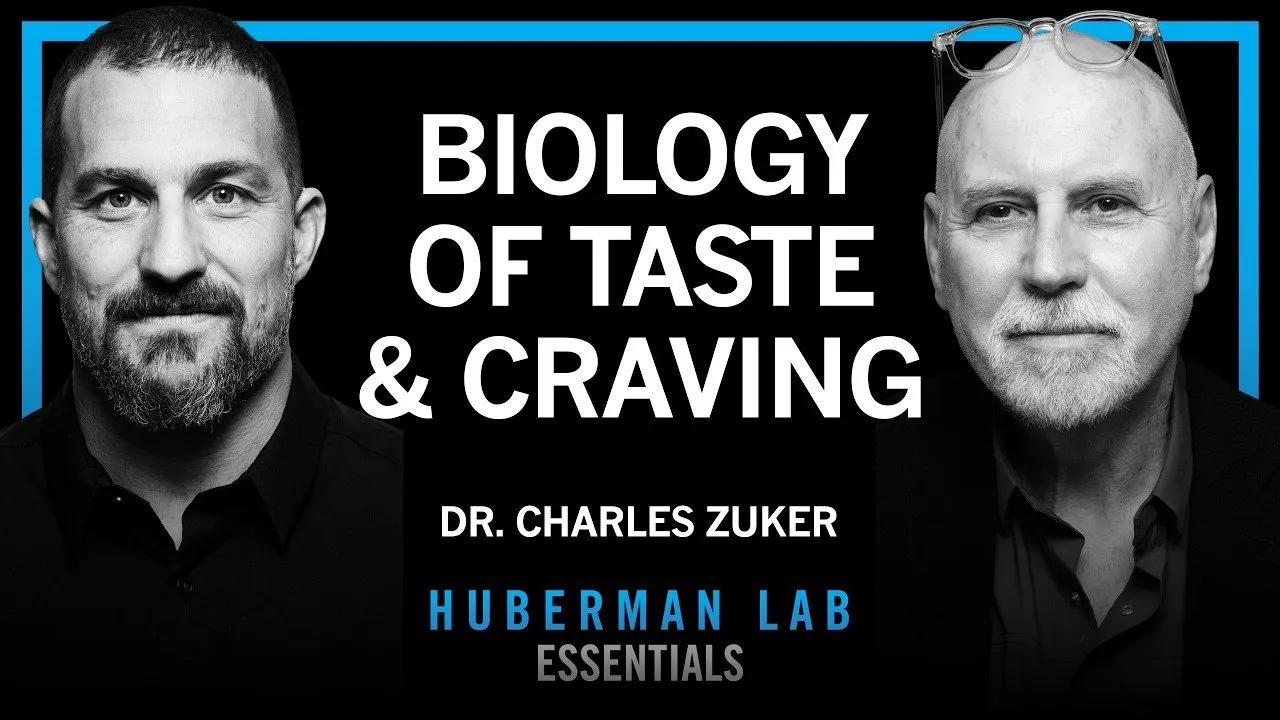Table of Contents
After working with over 600 startups at Y Combinator, Gustaf Alströmer has seen every possible way companies can fail—and the rare patterns that separate success from failure. His insights reveal why most startup advice misses the mark and what founders should actually focus on.
The most common startup failure isn't running out of money or facing competition—it's something far simpler and more preventable that 90% of founders struggle with despite knowing better.
Key Takeaways
- The primary reason startups fail is simple: they don't talk to customers, which means they never find product-market fit
- 90% of potential customers aren't early adopters—expect to contact 10 people to find one willing to try something new
- Technical founders or co-founders are essential; non-technical teams rarely succeed in building technology companies
- Successful founders share four key traits: determination to win, technical ability, customer obsession, and excellent communication skills
- Strategy matters in large corporations, but execution is everything for early-stage startups—focus on one priority at a time
- Office hours at YC center on one crucial question: "What's holding you back from moving faster?"
- Climate tech has shifted from impact-focused to economically-driven, creating trillion-dollar opportunities as the world transitions energy systems
- The fear of customer rejection prevents founders from doing the user research that could save their companies
- Watching customers use your product reveals pain points that direct questioning cannot uncover
Timeline Overview
- 00:00–10:31 — Gustaf's Background and Airbnb Magic: Why the growth team alumni can't find anything as special, the hiring philosophy that created family-like bonds, and how diverse founder backgrounds shaped culture
- 10:31–16:03 — Founder Motivations and Red Flags: Why desperation isn't the right framing, the variety of valid motivations for starting companies, and clear signals someone shouldn't start a startup
- 16:03–27:57 — YC Office Hours Revealed: The two questions that matter most, how accountability drives progress, why starting a company is incredibly lonely, and overcoming customer rejection fears
- 27:57–37:42 — Technical Requirements and Customer Discovery: Why watching users matters more than asking them, the necessity of technical co-founders, and how non-technical founders can succeed
- 37:42–58:27 — Success Patterns and Prediction Limits: Four key founder attributes, why YC can't predict breakout companies, and how speed vs. quality creates false choices
- 58:27–1:16:49 — Climate Tech Revolution: Why trillion-dollar market transitions attract top talent, the shift from impact to economics, and specific companies revolutionizing energy, shipping, and carbon accounting
</details>
The Airbnb Alumni Phenomenon: What Made It So Special
Gustaf Alströmer's journey from Airbnb's original growth team to Y Combinator partner provides unique insight into what separates truly exceptional companies from the rest. His observation that virtually no Airbnb alumni have found anything better speaks to a phenomenon worth understanding.
"It did not feel like a normal job—it felt more like a group of friends trying to do something together," Alströmer explains. This wasn't accidental. Airbnb's founders created an intentional hiring philosophy focused on three elements: genuine excitement about building Airbnb specifically, cultural alignment through extensive culture interviews, and diverse backgrounds—particularly former founders who brought different perspectives to decision-making.
The magic formula combined exceptional people with an obviously great business model that was hard to fail with individually while still succeeding as a company. This gave everyone permission to take risks and experiment, knowing the overall trajectory remained strong.
This experience shaped how Alströmer now evaluates startups at YC. The companies that recreate elements of that special culture—hiring people genuinely excited about the specific mission, maintaining high bars for team quality, and building diverse founding teams—tend to outperform others with similar ideas or markets.
The Real Reason 90% of Startups Fail
After analyzing patterns across 600+ companies, Alströmer has identified the primary failure mode with stark clarity: "If I drill down to what makes companies fail, it's quite simple—they don't talk to users, which means they don't find product-market fit."
This seems obvious, yet founders consistently struggle with customer discovery for psychological reasons. They fear rejection, assume they already know what to build, or get distracted by external validation from investors and accelerators that they confuse with actual product-market fit.
The statistics are unforgiving: only 10% of potential customers are early adopters willing to try something new. This means founders need to contact at least 10 people to find one interested prospect, and many more to find someone willing to pay. Technical founders, who often haven't done sales before, get surprised by these percentages and give up too quickly.
"People confuse external validation with the thing that matters most, which is talking to customers and learning what matters," Alströmer notes. YC has to remind every batch on day one that none of them have product-market fit yet, despite whatever investor interest brought them to the program.
The YC Office Hours Framework That Actually Works
Y Combinator's office hours have become legendary for pivoting companies toward success, but the specific questions and format remain largely mysterious. Alströmer reveals the exact framework that has guided hundreds of companies.
In individual office hours, the single most important question is: "What's holding you back from moving faster?" This isn't about updates or strategy—it's about identifying specific blockers that prevent progress toward clear goals. Most founders don't actually know what's slowing them down until this probing conversation forces discovery.
Group office hours serve two different purposes. First, they combat the profound loneliness of starting a company. "You can't really lean on your employees and say 'Hey, I'm feeling really shitty as a founder today,'" Alströmer explains. When founders realize all companies are broken in some way, it provides both motivation and practical problem-solving approaches.
Second, they create accountability through simple questions: What were your goals for the last two weeks? Did you hit them? What are your goals for the next two weeks? Founders are competitive and don't want to return empty-handed, driving consistent progress.
The most magical aspect is how this intensive three-month period creates lasting bonds. Many founders continue meeting in these formats for years afterward, having discovered that structured peer accountability accelerates progress better than individual grinding.
Why Technical Co-Founders Are Non-Negotiable
One of YC's strongest screening criteria is having technical founders or co-founders who can build the initial product. Alströmer uses a perfect analogy to explain why: "I have an idea for a song, I just need a musician to help me make it. That's similar to how it is with engineering."
This perspective reveals how non-technical founders often undervalue engineering contributions. When equity splits show 90% for the "idea person" and 10% for the engineer, it signals fundamental misunderstanding of where value creation actually happens.
The reasoning goes beyond just building the first version. "So many of the decisions you're going to make are technical, and so many of the iterations rely on engineering." Without understanding these constraints and possibilities, founders make poor strategic decisions throughout the company's evolution.
However, non-technical founders can succeed through two paths: learning to code sufficiently to understand engineering value and build prototypes, or finding technical co-founders (not contractors) who become true partners in the business. The key distinction is having someone with founder-level commitment making technical decisions, not hired help executing specifications.
The Four Attributes of Successful Founders
Across 600+ companies, Alströmer has identified four consistent characteristics among successful founders that matter more than market size or initial traction.
First: Determination and Inspirational Leadership. Successful founders have "an internal motivation that's infectious to people around them." This isn't just persistence—it's the ability to maintain drive while inspiring others to join the mission. People want to work for founders they believe will succeed.
Second: Technical Competence. Whether through personal coding ability or deep partnership with technical co-founders, successful companies have founders who understand technology's role in solving problems. "More technical founders are more likely to succeed," Alströmer states definitively.
Third: Customer Obsession and Speed. Great founders "figure out how to talk to users and move fast early on." They don't wait for permission from investors or advisors—they make continuous progress weekly, driven by customer feedback rather than external expectations.
Fourth: Excellent Communication Skills. The ability to communicate complicated ideas clearly correlates with fundraising success, team building, and customer acquisition. "Communication and storytelling are part of the same arc that motivates people around you."
What separates true outliers from merely successful companies involves unknowable factors—the "illogical" ideas that most investors initially reject but transform entire industries.
Dollar-Driven Customer Discovery Techniques
Standard customer interviews often yield misleadingly positive feedback because customers are polite and want to be helpful. Alströmer advocates for "dollar-driven discovery" that reveals genuine purchase intent through behavioral observation rather than stated preferences.
The most powerful technique is watching customers work through their current processes. "You have to watch people solve the thing that they do," rather than asking hypothetical questions about problems they might have. A non-technical person doing the same Excel task repeatedly because they don't know how to automate it reveals pain that direct questioning would miss.
For physical products or services, Alströmer recommends direct experience: "Rent an EV and go charge at all the non-Tesla chargers and see what you experience." The reality of broken charging networks and terrible apps becomes visceral in ways that market research cannot capture.
The fear of rejection prevents many founders from doing this essential work. Alströmer reframes rejection through a helpful analogy: when you sign up for services and never use them, you don't hate the company—you're simply indifferent and busy. "The worst thing that can happen to a startup is not that people hate what you're doing—it's that they're completely indifferent."
The Climate Tech Economic Revolution
Alströmer has been instrumental in Y Combinator's climate tech focus, funding over 130 companies in the space. His thesis challenges the common perception that climate startups are primarily impact-driven rather than economically viable.
"The world has decided that we're going to stop doing the things we're doing and change our entire energy system," Alströmer explains. This transition involves trillions of dollars moving from carbon-intensive to clean technologies. "Software is not that big in comparison—it's much smaller than this transition."
Tesla's success demonstrates the economic potential: despite providing only a couple percent of new car sales in the US, it became one of the world's most valuable companies with the richest person as CEO. "We've only seen the beginning of this."
The shift attracts accomplished software engineers and founders who recognize their skills are directly applicable to climate solutions. Alströmer receives weekly emails from engineers asking which climate companies to join, reflecting a broader talent migration toward the space.
Two key developments have accelerated this transition: political support through legislation like the Inflation Reduction Act, and corporate customers who now have budgets and mandates to reduce emissions. "Fortune 100 companies are now showing up as customers, not just with interest but paying actual contracts."
Common Questions
Q: What's the most important question YC asks in office hours?
A: "What's holding you back from moving faster?" This crystallizes priorities and helps founders discover specific blockers preventing progress toward their goals.
Q: How important is it to have a technical co-founder?
A: Essential for technology companies. Non-technical founders can succeed by learning to code sufficiently or finding technical co-founders (not contractors) who become true partners.
Q: What percentage of potential customers are early adopters?
A: Only about 10%. This means you need to contact at least 10 people to find one willing to try something new, requiring significant outreach effort.
Q: Can YC predict which companies will be the biggest successes?
A: No. YC is better at identifying failure patterns than predicting outlier success. The best companies often have "illogical" ideas that don't make sense initially.
Q: What's the biggest mistake technical founders make?
A: Not talking to customers. Technical founders often assume software can solve everything without validating what customers actually need.
Conclusion
Gustaf Alströmer's insights from 600+ startups reveal that success comes down to fundamentals: talking to customers, building technical competence, and maintaining relentless focus on execution over strategy. The companies that master these basics while avoiding common failure patterns give themselves the best chance at building something meaningful.





